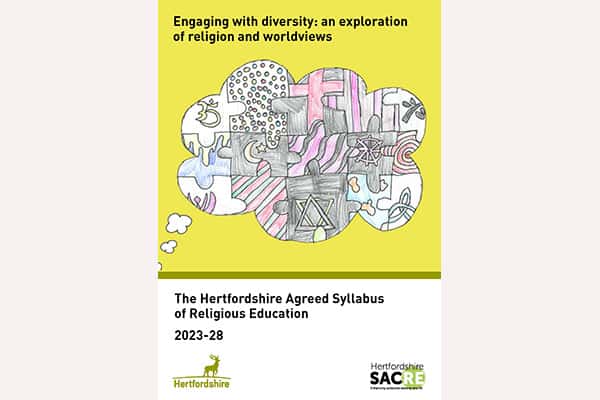Leaders prioritise RE and ensure it is well sequenced, ambitious, and carefully adapted for mixed-age classes.
SIAMS inspection report 2025
What religious education is and is not!
Religious education (RE) should enable every child to flourish and to live life in all its fullness. It will help educate for dignity and respect, encouraging all to live well together.
RE is concerned with “learning about religions” and “learning from religion” and it is not the practice of this school to preach to, or attempt to convert, the children. The faith background of both the staff and every child’s family is respected at all times. Our school is committed to valuing the opinions, beliefs, and practices of all, and to showing sensitivity to minority groups.
RE is never about telling pupils what religious views they should have, but rather assists them in gaining shared human understanding, developing personal identity, and searching for meaning in the context of evaluating different viewpoints.
Religious Education (RE) is not a National Curriculum subject but must be provided for all registered pupils in state-funded schools in England, including those in the sixth form, unless withdrawn by their parents. It is a necessary part of a broad and balanced curriculum. As RE is not nationally determined, a locally agreed syllabus of RE is prepared by a local Standing Advisory Council on Religious Education (SACRE) and adopted by a local authority. As a Hertfordshire school, it is the Hertfordshire Agreed Syllabus of Religious Education which we have used as the basis for our planning and delivery of RE. You can download the Agreed Syllabus by using the button below. You can also find out more about about the work of the SACRE by following the last link.


What we study in RE
Pupils and their families can expect a high-quality RE curriculum that is rich and varied, enabling learners to acquire a thorough knowledge and understanding of a range of faiths and world views.
The principal religious traditions taught are, in accordance with guidance from the DfE, Christianity, Buddhism, Hinduism, Islam, Judaism, and Sikhism. Humanism and Atheism are world views which are also appropriate to include as part of the RE curriculum. Where we have pupils who are members of other world faiths (e.g. Baha’i or Jain) then, in line with our inclusion policy and valuing of the individual, we will include aspects of that religion in RE.
We seek to provide all pupils with opportunities:
- To know about and understand Christianity as a diverse, global, living faith through the exploration of core beliefs using an approach that critically engages with biblical text.
- To gain knowledge and understanding of a range of religions and worldviews appreciating diversity, continuity, and change within the religions and worldviews being studied.
- To engage with challenging questions of meaning and purpose raised by human existence and experience.
- To recognise the concept of religion and its continuing influence on Britain’s cultural heritage, and in the lives of individuals and societies in different times, cultures, and places.
- To explore their own religious, spiritual, and philosophical ways of living, believing, and thinking.
Why we study RE
At Bayford School we believe that RE both supports and strengthens what we aim to do in every aspect of school life. Our caring ethos, and the value which we place on the development of the whole child, spiritually, morally, socially, culturally, and intellectually, is reflected in the RE curriculum.
RE provokes challenging questions about the ultimate meaning and purpose of life: beliefs about God, the self, and the nature of reality, issues of right and wrong, and what it means to be human. It challenges pupils to reflect on, consider, analyse, interpret, and evaluate issues of truth, belief, faith, and ethics, and to communicate their responses.
RE teaching provides pupils with a systematic knowledge and understanding about Christianity, principal religions, and worldviews which give life value. RE aims to enable pupils to become religiously and theologically literate so that they can engage in life in an increasingly diverse society.


Right of withdrawal
In view of the importance placed on RE as a core subject in a church school, we would hope that all children admitted will participate fully in RE. We aim to provide an open curriculum which can be taught to all pupils, by all staff.
However, parents have a legal right to withdraw their child from RE. We will comply with any request from a parent to withdraw their child and parents are not required to give their reasons for wanting to do so.
Pupils who have been withdrawn from RE will be cared for and supervised by school staff during the teaching of RE in school and during school trips and other activities which are directly related to RE. Pupils who have been withdrawn will be treated with great respect and provided with activities which are stimulating, educational, and rewarding. Every effort will be made to ensure that they do not feel marginal, devalued, punished, or a nuisance.
This page was last updated on 9th July 2025
